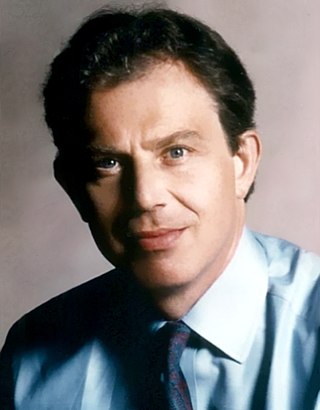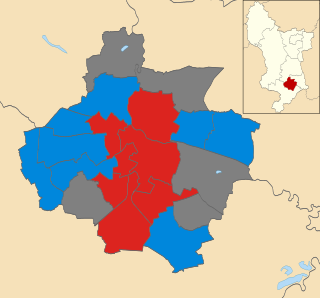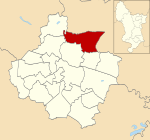
Liverpool, West Derby is a constituency represented in the House of Commons of the UK Parliament since 2019 by Ian Byrne of the Labour Party. On 23 July 2024, Byrne was suspended from the Labour Party and had the whip withdrawn for six months, for voting to scrap the two child benefit cap. He now sits as an Independent.

Derby South is a constituency formed of part of the city of Derby, most recently represented in the House of Commons of the UK Parliament since 2024 by Baggy Shanker of the Labour and Co-op Party. Previous MP, Margaret Beckett, served the constituency for 41 years. She served under the Labour governments of Harold Wilson, James Callaghan, Tony Blair and Gordon Brown. She became interim Leader of the Labour Party in 1994 when John Smith suddenly died. She also served in the Opposition front bench under Neil Kinnock and Smith himself.

The 1995 United Kingdom local elections took place on Thursday 6 April 1995 in Scotland, and Thursday 4 May 1995 in England and Wales. The Conservative Party lost over 2,000 councillors in the election, while the Labour Party won 48% of the vote, a record high for the party in local elections.
Derby City Council elections are held every four years to elect members of Derby City Council, the local authority for the unitary authority of Derby in Derbyshire, England. Since the last boundary changes in 2023, 51 councillors have been elected from 18 wards. Prior to 2023 elections were held three years out of every four, with a third of the council elected each time.

West Derby ward was an electoral district of Liverpool City Council from 1835 to 1953 and again from 2004 to 2023.
The 1992 York City Councils elections were held in May 1992 to elect members of York City Council in North Yorkshire, England. Fifteen seats, previously contested in 1988, were up for election: eleven were won by the Labour Party, three by the Conservative Party and one by the Liberal Democrats. The Labour Party retained overall control of the council; the composition of the council after the election was: Labour Party 34 seats, Conservative Party seven seats and Liberal Democrats four seats.
The 1973 Derby Borough Council election took place on 7 June 1973 to elect members of Derby Borough Council in England. This was on the same day as other local elections. Voting took place across 18 wards, each electing 3 Councillors. Following the Local Government Act 1972, this was the first election to the new non-metropolitan district council for Derby, which came into being on 1 April the following year. The Labour Party took control of the Council after winning a majority of seats.

The 1980 Derby City Council election took place on 1 May 1980 to elect members of Derby City Council in England. This was on the same day as other local elections. 14 of the council's 44 seats were up for election. The Labour Party retained control of the council.

The 1982 Derby City Council election took place on 6 May 1982 to elect members of Derby City Council in England. This was on the same day as other local elections. 15 of the council's 44 seats were up for election. The Labour Party retained control of the council.

The 1983 Derby City Council election took place on 5 May 1983 to elect members of Derby City Council in England. This was on the same day as other local elections. 15 of the council's 44 seats were up for election. The Labour Party retained control of the council.

The 1984 Derby City Council election took place on 3 May 1984 to elect members of Derby City Council in England. This was on the same day as other local elections. 15 of the council's 44 seats were up for election. The Labour Party retained control of the council.

The 1986 Derby City Council election took place on 8 May 1986 to elect members of Derby City Council in England. Local elections were held in the United Kingdom in 1986. This was on the same day as other local elections. 15 of the council's 44 seats were up for election. The Labour Party retained control of the council.

The 1987 Derby City Council election took place on 7 May 1987 to elect members of Derby City Council in England. Local elections were held in the United Kingdom in 1987. This was on the same day as other local elections. 15 of the council's 44 seats were up for election. The Labour Party retained control of the council.

The 1988 Derby City Council election took place on 5 May 1988 to elect members of Derby City Council in England. Local elections were held in the United Kingdom in 1988. This was on the same day as other local elections. 15 of the council's 44 seats were up for election. The Conservatives gained control of the council from the Labour Party.

The 1990 Derby City Council election took place on 3 May 1990 to elect members of Derby City Council in England. Local elections were held in the United Kingdom in 1990. This was on the same day as other local elections. 16 of the council's 44 seats were up for election. The Conservative Party retained control of the council.

The 1991 Derby City Council election took place on 2 May 1991 to elect members of Derby City Council in England. Local elections were held in the United Kingdom in 1991. This was on the same day as other local elections. 15 of the council's 44 seats were up for election. The council, which had previously been under Conservative council, fell under no overall control with the Conservatives and Labour holding exactly half the seats each.

The 1994 Derby City Council election took place on 5 May 1994 to elect members of Derby City Council in England. Local elections were held in the United Kingdom in 1994. This was on the same day as other local elections. The Labour Party gained control of the council, which had previously been under no overall control.

The 1995 Derby City Council election took place on 4 May 1995 to elect members of Derby City Council in England. Local elections were held in the United Kingdom in 1995. This was on the same day as other local elections. The Labour Party retained control of the council.

The 1996 Derby City Council election took place on 2 May 1996 to elect members of Derby City Council in England. Local elections were held in the United Kingdom in 1996. This was on the same day as other local elections. This election was held ahead of Derby City Council becoming a unitary authority on 1 April 1997. As a result, the entire council was up for election and the elected councillors acted as a shadow authority until that date. The Labour Party retained control of the council.

The 2021 Derby City Council election took place on 6 May 2021 to elect members of Derby City Council in England. This was on the same day as other local elections. One-third of the seats were up for election, with one ward (Darley) electing two councillors.






























